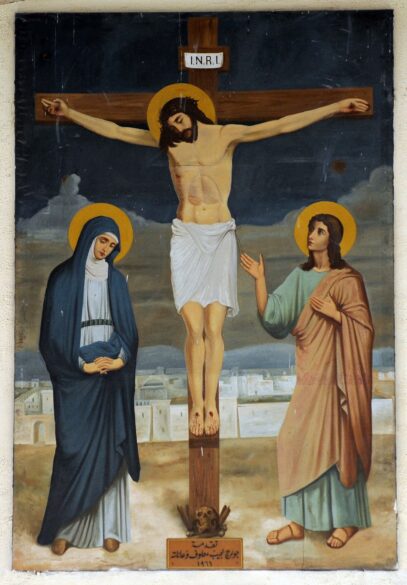By Lorene Hanley Duquin
(OSV News) — Sometimes the words we use in Holy Week and Easter feel so familiar we don’t consider their origins. Same for the date of Easter, which changes from year to year. The following is a quick FAQ guide to Catholics’ Holy Week vocabulary and key history.
Q. Why do we use the word “Passion” to describe the suffering of Jesus?
A. The word “Passion” comes from the Latin word for suffering. When referring to the events leading up to the death of Jesus, we often capitalize the word “Passion” to differentiate from the modern meaning of the word with its romantic overtones.
Q. Why do some parishes cover the cross and statues during Holy Week?
A. Before 1970 it was customary to cover crosses and statues during the last two weeks of Lent. After 1970, the practice was left up to the discretion of each diocese. In 1995, the U.S. bishops’ liturgy committee gave individual parishes permission to reinstate the practice on their own.
Q. What is Tenebrae?

A. The word “tenebrae” comes from the Latin word meaning “shadows” or “darkness.” It was originally the name given to somber parts of the Liturgy of the Hours that are chanted in monasteries on the last three days of Holy Week. The tone of the prayers is filled with sorrow and desolation. At various points during a Tenebrae service, candles are extinguished and there is a cacophony of noise, which evokes feelings of betrayal, abandonment, pain, sadness, and darkness associated with the crucifixion and death of Jesus. Parishes sometimes offer Tenebrae services during Holy Week.
Q. Why do we call it “Good Friday”?
A. In the English language the term “Good Friday” probably evolved from “God’s Friday” in the same way that “goodbye” evolved from “God be with you.”
Q. Why do some parishes celebrate the Good Friday liturgy in the afternoon and others in the evening?
A. Ideally, the liturgy should take place at 3 p.m. However, in order to encourage more people to attend, the liturgy can take place later in the evening, but never after 9 p.m.
Q. What is Pascha?
A. The word “Pascha,” or “Pasch,” comes from the Greek word for the Passover. The early Christians used the word to describe the resurrection of Jesus as the Christian Passover. Today, we sometimes refer to the death and resurrection of Jesus as the Paschal Mystery, which is derived from the word Pasch. Orthodox Christians still use the word Pascha when referring to Easter.
Q. Who decides the date of Easter?
A. In 325, the Council of Nicaea decreed that Easter would be celebrated on the Sunday following the first full moon after the spring equinox. It can occur as early as March 22 or as late as April 25.
(Lorene Hanley Duquin is a Catholic author and lecturer who has worked in parishes and on a diocesan level.)
